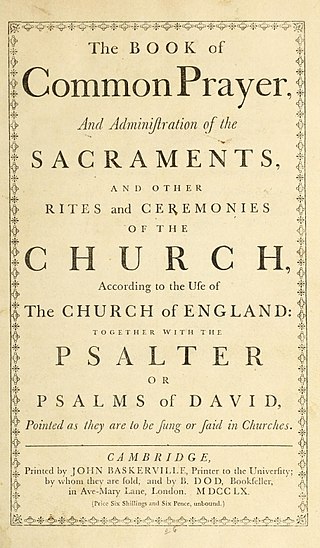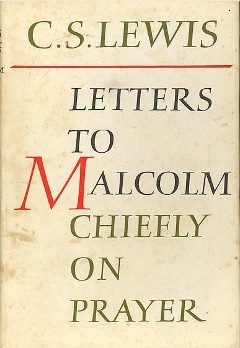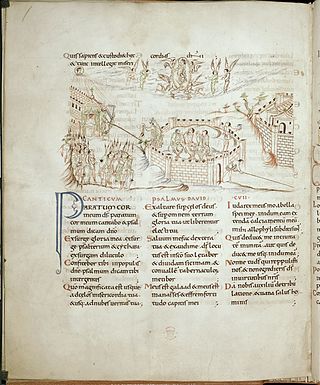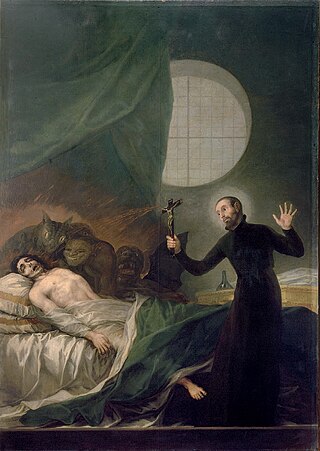
The Athanasian Creed — also called the Pseudo-Athanasian Creed or Quicunque Vult, which is both its Latin name and its opening words, meaning "Whosoever wishes" — is a Christian statement of belief focused on Trinitarian doctrine and Christology. Used by Christian churches since the early sixth century, it was the first creed to explicitly state the equality of the three hypostases of the Trinity. It differs from the Nicene-Constantinopolitan Creed and the Apostles' Creed in that it includes anathemas condemning those who disagree with its statements.

The Book of Common Prayer (BCP) is the name given to a number of related prayer books used in the Anglican Communion and by other Christian churches historically related to Anglicanism. The first prayer book, published in 1549 in the reign of King Edward VI of England, was a product of the English Reformation following the break with Rome. The work of 1549 was the first prayer book to include the complete forms of service for daily and Sunday worship in English. It contained Morning Prayer, Evening Prayer, the Litany, and Holy Communion and also the occasional services in full: the orders for Baptism, Confirmation, Marriage, "prayers to be said with the sick", and a funeral service. It also set out in full the "propers" : the introits, collects, and epistle and gospel readings for the Sunday service of Holy Communion. Old Testament and New Testament readings for daily prayer were specified in tabular format as were the Psalms and canticles, mostly biblical, that were provided to be said or sung between the readings.

The Lord's Prayer, often known by its incipit Our Father, is a central Christian prayer which Jesus taught as the way to pray. Two versions of this prayer are recorded in the gospels: a longer form within the Sermon on the Mount in the Gospel of Matthew, and a shorter form in the Gospel of Luke when "one of his disciples said to him, 'Lord, teach us to pray, as John taught his disciples'". Regarding the presence of the two versions, some have suggested that both were original, the Matthean version spoken by Jesus early in his ministry in Galilee, and the Lucan version one year later, "very likely in Judea".

Prayer is an invocation or act that seeks to activate a rapport with an object of worship through deliberate communication. In the narrow sense, the term refers to an act of supplication or intercession directed towards a deity or a deified ancestor. More generally, prayer can also have the purpose of thanksgiving or praise, and in comparative religion is closely associated with more abstract forms of meditation and with charms or spells.

Teresa of Ávila, OCD, also called Saint Teresa of Jesus, was a Carmelite nun and prominent Spanish mystic and religious reformer.

The Quba Mosque is a mosque located in Medina, in the Hejazi region of Saudi Arabia, built in the lifetime of the Islamic prophet Muhammad in the 7th century C.E. It is thought to be the first mosque in the world, built on the first day of Muhammad's emigration to Medina. Its first stone is said to have been laid by the prophet, and the structure completed by his companions.
The Fellowship, also known as The Family, is a U.S.-based nonprofit religious and political organization founded in April 1935 by Abraham Vereide. The stated purpose of The Fellowship is to provide a fellowship forum where decision makers can attend Bible studies, attend prayer meetings, worship God, experience spiritual affirmation and receive support.
"The War Prayer", a short story or prose poem by Mark Twain, is a scathing indictment of war, and particularly of blind patriotic and religious fervor as motivations for war. The structure of the work is simple: an unnamed country goes to war, and patriotic citizens attend a church service for soldiers who have been called up. The people call upon God to grant them victory and protect their troops. Suddenly, an "aged stranger" appears and announces that he is God's messenger. He explains to them that he is there to speak aloud the second part of their prayer for victory, the part which they have implicitly wished for but have not spoken aloud themselves: the prayer for the suffering and destruction of their enemies. What follows is a grisly depiction of hardships inflicted on war-torn nations by their conquerors. The story ends with the man being ignored.
Richard James Foster is a Christian theologian and author in the Quaker tradition. His writings speak to a broad Christian audience. Born in 1942 in New Mexico, Foster has been a professor at Friends University and pastor of Evangelical Friends churches. Foster resides in Denver, Colorado. He earned his undergraduate degree at George Fox University in Oregon and his Doctor of Pastoral Theology at Fuller Theological Seminary, and received an honorary doctorate from Houghton College.
In the Chinese common religion and philosophical schools the idea of the universal God has been expressed in a variety of names and representations, most notably as 天 and 上帝.

Eugene Hoiland Peterson was an American Presbyterian minister, scholar, theologian, author, and poet. He wrote over 30 books, including the Gold Medallion Book Award–winner The Message: The Bible in Contemporary Language, an idiomatic paraphrasing commentary and translation of the Bible into modern American English using a dynamic equivalence translation approach.

Lifemask is the sixth album by English folk / rock singer-songwriter and guitarist Roy Harper, and was first released in 1973 by Harvest Records.
Mark Richard is an American short story writer, novelist, screenwriter, and poet. He is the author of two award-winning short story collections, The Ice at the Bottom of the World and Charity, a bestselling novel, Fishboy, and House of Prayer No. 2: A Writer's Journey Home.

Wing and a Prayer, The Story of Carrier X is a black-and-white 1944 war film about the heroic crew of an American aircraft carrier in the desperate early days of World War II in the Pacific theater, directed by Henry Hathaway and starring Don Ameche, Dana Andrews and William Eythe. Although arguably a classic propaganda movie, it was appreciated for its realistic portrayal and was nominated for the 1944 Academy Award for Best Original Screenplay.

Letters to Malcolm: Chiefly on Prayer is a book by C. S. Lewis, published posthumously in 1964. The book takes the form of a series of letters to a fictional friend, "Malcolm", in which Lewis meditates on prayer as an intimate dialogue between man and God. Beginning with a discussion of "corporate prayer" and the liturgical service, Lewis goes on to consider practical and metaphysical aspects of private prayer, such as when to pray and where, ready-made prayer, petitionary prayer, prayer as worship, penitential prayer, and prayer for the dead. The concluding letter discusses "liberal" Christians, the soul and resurrection.

Psalm 108 is the 108th psalm in the Book of Psalms. It is a hymn psalm, beginning in English in the King James Version: "O God, my heart is fixed; I will sing and give praise, even with my glory". In the slightly different numbering system used in the Greek Septuagint version of the bible, and in the Latin Vulgate, this psalm is Psalm 107.In Latin, it is known as "Paratum cor meum Deus". It is attributed to David.

Nelle Clyde Wilson Reagan was the mother of 40th United States President Ronald Reagan (1911–2004) and his older brother Neil Reagan (1908–1996).

Psalm 150 is the 150th and final psalm of the Book of Psalms, beginning in English in the King James Version: "Praise ye the LORD. Praise God in his sanctuary". In Latin, it is known as "Laudate Dominum in sanctis eius". In Psalm 150, the psalmist urges the congregation to praise God with music and dancing, naming nine types of musical instruments.

4Q448, often called the "Hymn to King Jonathan," is a piece of parchment from among the Dead Sea Scrolls, found in Cave 4, containing two separate short works, part of Psalm 154 and a prayer mentioning a King Jonathan (Yəhōnatan).

The Catholic Church authorizes the use of exorcism for those who are believed to be the victims of demonic possession. In Roman Catholicism, exorcism is a sacramental but not a sacrament, unlike baptism or confession. Unlike a sacrament, exorcism's "integrity and efficacy do not depend ... on the rigid use of an unchanging formula or on the ordered sequence of prescribed actions. Its efficacy depends on two elements: authorization from valid and licit Church authorities, and the faith of the exorcist." The Catechism of the Catholic Church states: "When the Church asks publicly and authoritatively in the name of Jesus Christ that a person or object be protected against the power of the Evil One and withdrawn from his dominion, it is called exorcism."














